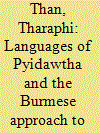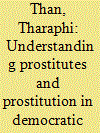| Srl | Item |
| 1 |
ID:
126650


|
|
|
|
|
| Publication |
2013.
|
| Summary/Abstract |
Burma's first well known welfare plan was entitled Pyidawtha or Happy Land, and it was launched in 1952. In vernacular terms, the literal meaning of Pyidawtha is 'Prosperous Royal Country'. The government's attempt to sustain tradition and culture and to instil modern aspirations in its citizens was reflected in its choice of the word Pyidawtha. The Plan failed and its implications still overshadow the development framework of Burma. This paper discusses how the country's major decisions, including whether or not to join the Commonwealth, have been influenced by language; how the term and concept of 'development' were conceived; how the Burmese translation was coined to attract public support; and how the detailed planning was presented to the masses by the government. The paper also discusses the concerns and anxieties of the democratic government led by U Nu in introducing Burma's first major development plan to a war-torn and bitterly divided country, and why it eventually failed.
|
|
|
|
|
|
|
|
|
|
|
|
|
|
|
|
| 2 |
ID:
111470


|
|
|
|
|
| Publication |
2011.
|
| Summary/Abstract |
Prostitution in Burmese society, as in many South East Asian countries, is a taboo subject. Unlike prostitution in countries such as Thailand, however, prostitution in Burma does not attract strong media or scholarly debate. The state and the media in Burma, during both colonial and post-colonial periods, have tended and tend to see the problem of prostitution as one of 'others'. Colonialism, a decline in morality and the corruption of women influenced by modernity or Western culture have often been portrayed as the culprits. This article analyses the Burmese terms for prostitutes and examines how prostitution was portrayed by the print media between 1942 and 1962, during which time the press was thought to have enjoyed a certain degree of freedom. Seen as a threat to the British troops during the colonial period, prostitutes were subject to controversial medical screenings; yet, seen as victims of modernity during Burma's parliamentary period (1948-62), they were often left on their own to 'resurrect' their morality.
|
|
|
|
|
|
|
|
|
|
|
|
|
|
|
|